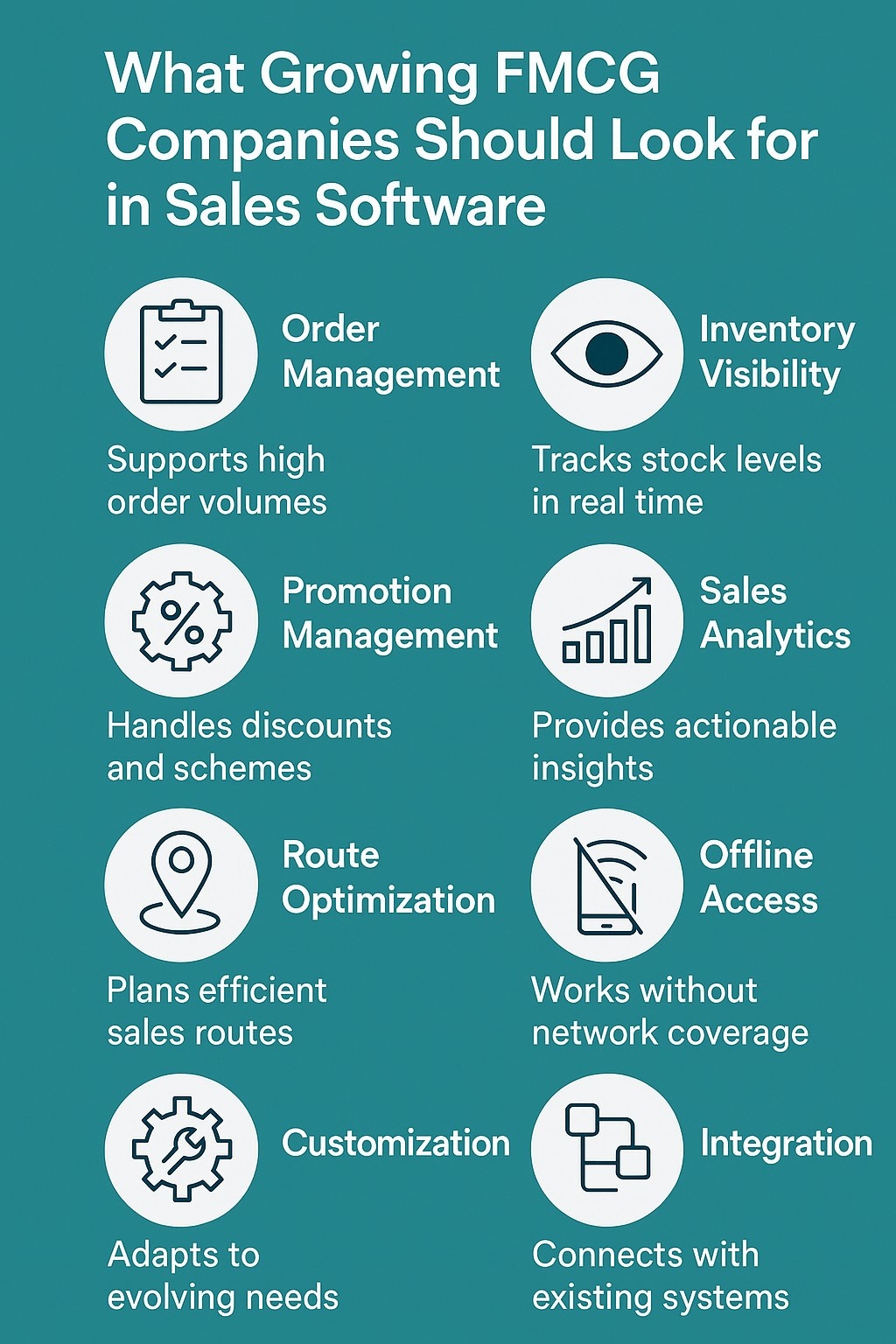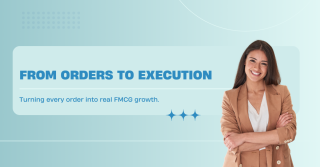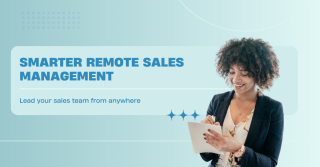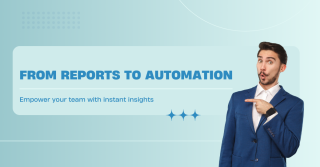How to Select the Best Sales Software for Your Growing FMCG Brand: The Ultimate Guide

The FMCG (Fast-Moving Consumer Goods) industry is evolving at breakneck speed. Increased competition, shifting consumer preferences, and the explosion of digital retail have forced brands, big and small - to innovate and adapt rapidly.
In this dynamic environment, Sales Force Automation (SFA) tools have become indispensable. Whether you're an emerging snack brand or a regional beverage company, leveraging the right sales software is no longer a luxury - it's a business survival strategy.
According to Salesforce study,
- 91% of high-performing sales teams rely on SFA or CRM tools to stay competitive.
- Companies adopting SFA report a 14.5% productivity boost and a 12.5% reduction in marketing expenses.
Clearly, investing in sales automation is not about replacing people, it's about empowering them to sell smarter, faster, and better.
Why Growing FMCG Brands Must Prioritize Sales Automation?
Here’s why you can't afford to delay:
Complex distribution networks need real-time visibility.
Retail execution is critical for product visibility and promotions.
Scheme management requires agility to adapt to market needs.
Competition is fierce; brands with better market intelligence win shelf space.
Data-driven decisions are now the backbone of successful sales strategies.
A report from McKinsey states that FMCG brands using SFA effectively have seen a 20–30% improvement in on-field sales force efficiency and a 10–15% increase in order volumes.
Simply put:
Without the right sales software, your team is working harder, not smarter.
Key Features to Look for in Sales Software for FMCG Growth
1. Business-First Design: Solutions, Not Just Software
The best sales applications are those that mirror your business processes — not the other way around.
Before selecting a provider, ask:
- Can the software be customized to fit your existing promotions and schemes?
- Does it provide territory-specific analytics?
- Will it allow real-time tracking of retailer performance?
A growing FMCG company needs a flexible and modular solution that scales as you expand — not a rigid, one-size-fits-all platform.
👉 Pro Tip: Always request a demo tailored to your specific business use case — not just a generic product demo.
2. User-Friendly Interface: Simplicity Drives Adoption
Many field sales teams — especially in smaller towns — may not be tech-savvy. If the app is clunky or confusing:
Field adoption rates drop.
Sales data quality suffers.
Attrition risks rise.
What to check:
Simple dashboard navigation
Quick order booking workflow
Easy scheme selection during sales
Local language support (if needed)
Studies show that apps with an intuitive interface report a 30% higher adoption rate among frontline workers.
👉 Pro Tip: Involve a few field reps in the trial phase. Their feedback on usability can be priceless.
3. FMCG-Specific Expertise: Industry Understanding Matters
Sales processes in FMCG are very different from B2B SaaS or industrial goods.
Choose a provider who deeply understands:
Primary and secondary sales tracking
Beat planning and journey management
Dynamic scheme rollouts and tracking
Retailer loyalty program management
Multi-channel order capture (distributors, direct retailers, modern trade)
An SFA partner with deep FMCG experience can anticipate challenges you might not even see yet — and offer ready-to-implement solutions.
👉 Pro Tip: Ask for FMCG-specific case studies during your vendor evaluation.
4. Comprehensive Support: It’s a Partnership, Not a Purchase
Technology adoption isn’t just about buying a tool — it’s about changing behaviors.
Ensure your SFA provider offers:
Dedicated onboarding support
Role-specific training sessions (sales reps, supervisors, managers)
Live support channels (chat, call centers, ticketing systems)
Regular business reviews and optimization workshops
Brands that receive ongoing post-implementation support report a 22% higher ROI from sales automation investments (Forrester Research).
👉 Pro Tip: Choose partners, not vendors. Look for those who commit to quarterly health checks and continuous improvement.
Checklist for FMCG Sales Software

Conclusion: Empower Your Field Force, Accelerate Your Growth
Choosing the right Sales Software isn’t just a technology decision — it’s a business growth decision.
The right solution will:
Boost your sales force productivity
Provide real-time market intelligence
Streamline retailer and distributor operations
Increase your brand’s visibility and shelf-share
Strengthen customer and retailer loyalty
In today's competitive world, speed to market, agility in operations, and data-driven decision-making are what separate leaders from laggards.
If you’re serious about scaling your FMCG brand sustainably and profitably, investing in robust Sales Force Automation is your next strategic move.
Remember: Companies that automate more than half their sales processes outperform their competition by 15%–20% annually (Harvard Business Review).
Final Thought
Technology doesn't replace great salespeople — It empowers them to be even greater.
Ready to transform your sales operations and grow your brand faster?
Start by choosing the right Sales Software today!
FAQs: Sales Software for FMCG Companies
Q1: Is sales automation expensive for mid-sized FMCG companies?
A: No! Many SFA providers now offer flexible pricing models — including pay-per-user, modular licensing, and subscription models that are affordable even for SMEs.
Q2: How long does it take to see ROI after implementing SFA?
A: Typically, brands start seeing measurable results like increased order sizes and improved beat coverage within 3 to 6 months of implementation.
Q3: Will the sales team need intensive tech training?
A: Not if the software is designed for field usability. Most good SFA apps require just 2-3 hours of basic training to get started.
Q4: What if internet connectivity is poor in some areas?
A: Good SFA platforms work offline and sync data automatically once the device is online again, ensuring business continuity.
Q5: Can SFA help with distributor management too?
A: Absolutely. Some solutions integrate with Distributor Management Systems (DMS) to provide complete supply chain visibility from distributor to retailer.
Also Check
👉6 Game-Changing Sales Trends to Focus on in 2025
👉Effective Field Sales Solutions For FMCG
See What Users Say About Us!
Thousands of FMCG brands rely on Delta Sales App for smarter sales automation, real-time market insights, and streamlined field operations. Discover why businesses rate us highly on top review platforms and experience the difference yourself!
⭐ Delta Sales App on Capterra
Delta Sales App: Your Trusted Partner for FMCG Sales Success!









